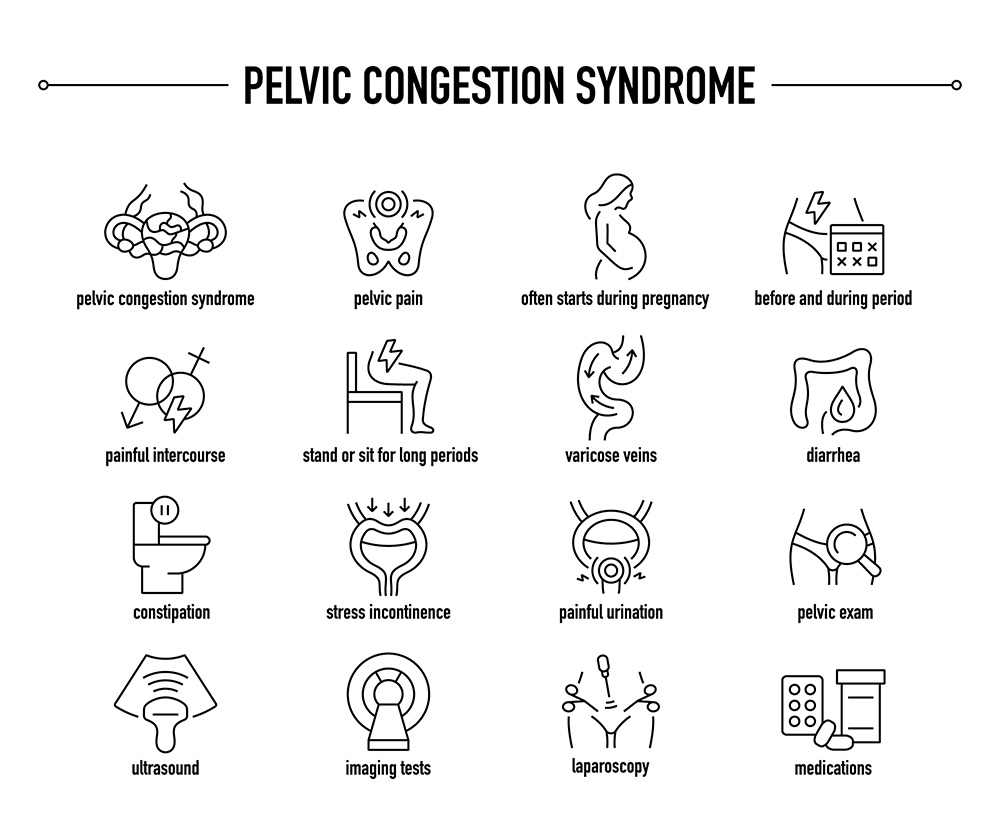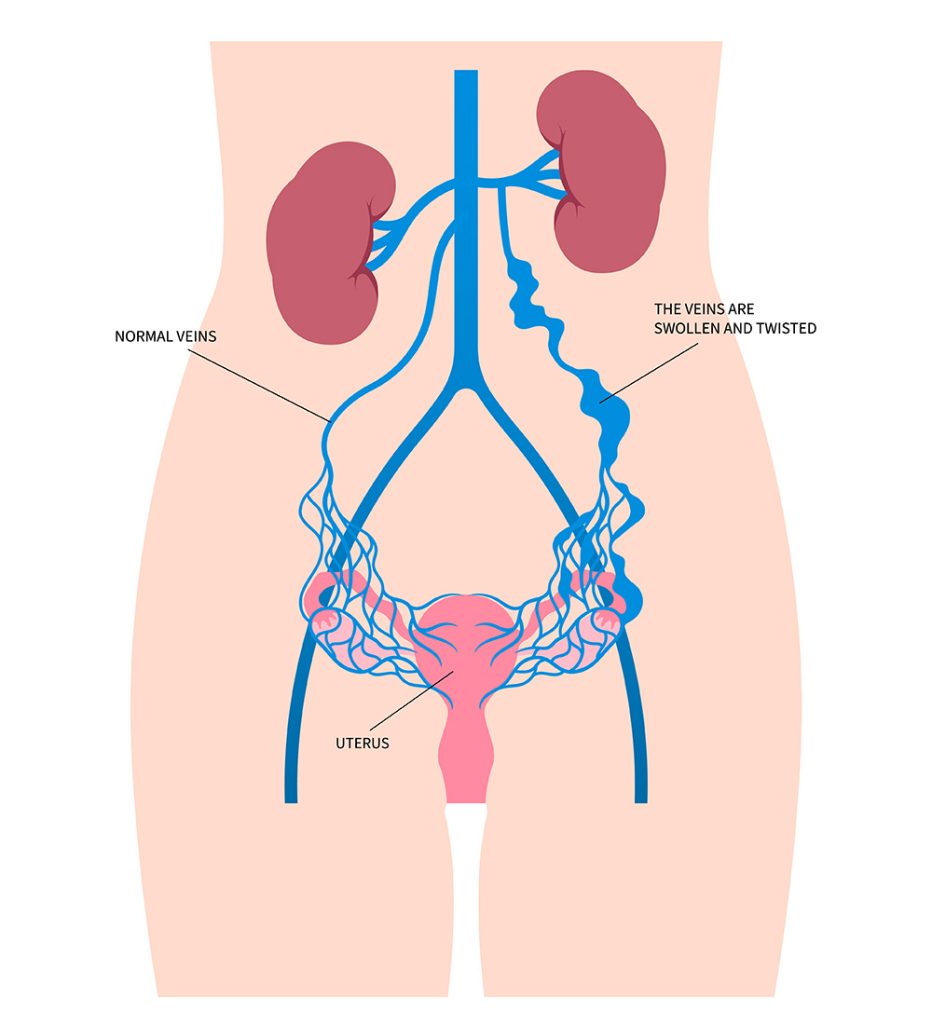Table of Contents
ToggleLast updated on September 16, 2025
Chronic pelvic pain is a common complaint among women, but its cause isn’t always easy to pinpoint. One condition that often flies under the radar is pelvic congestion syndrome (PCS), a vascular issue that results in the formation of pelvic varicose veins.
These dilated and weakened veins in the pelvis can lead to ongoing discomfort, especially for women of reproductive age. PCS is frequently misdiagnosed or mistaken for other gynaecological issues due to the general nature of its symptoms, making awareness and education crucial.
At Vein Doctors Sydney, we understand how frustrating it can be to live with unexplained pelvic pain. That’s why we offer advanced diagnostic and treatment options designed to relieve symptoms and restore your quality of life. In this article, you’ll learn what pelvic congestion syndrome is, what causes pelvic congestion syndrome, the typical symptoms and how it’s diagnosed and treated.
What is Pelvic Congestion Syndrome?
Pelvic congestion syndrome is a chronic condition caused by varicose veins that develop in the pelvic region.
Similar to varicose veins in the legs, these veins become stretched and swollen due to malfunctioning valves, leading to poor blood circulation. The blood starts to pool instead of flowing efficiently back toward the heart. This buildup of pressure in the veins results in pain and other symptoms that worsen throughout the day, particularly when standing for long periods.
PCS most often affects women in their 20s to 40s, especially those who have had multiple pregnancies. Pregnancy increases blood volume and places additional pressure on the pelvic veins, which can cause vein walls to weaken over time. While PCS is more common in women, in rare cases, it can also affect men.

Some contributing factors to pelvic congestion syndrome include failure of valves within the pelvic veins, hormonal influences and multiple pregnancies.
What Causes Pelvic Congestion Syndrome?
There are several contributing factors to the development of pelvic congestion syndrome. The most direct cause is the failure of valves within the pelvic veins—particularly the ovarian and internal iliac veins. When these valves fail to keep blood moving in the correct direction, blood begins to pool, leading to pressure and vein dilation.
Hormonal influences, especially oestrogen, also play a role by causing veins to dilate. This helps explain why PCS often emerges during childbearing years.
Multiple pregnancies significantly increase the risk, as the pelvic veins stretch and may not return to their normal state postpartum. Additionally, genetic predisposition to varicose veins, underlying vein disease, or anatomical abnormalities in vein structure may contribute to the development of PCS.
Although it is primarily vascular in nature, PCS is often confused with gynaecological or gastrointestinal disorders because of symptom overlap, further complicating diagnosis.
Pelvic Congestion Syndrome Symptoms
The symptoms of pelvic congestion syndrome can be ongoing or cyclical, and they typically worsen throughout the day as blood pools in the pelvic veins due to gravity. The discomfort is often described as a dull, aching pain in the lower abdomen or pelvis, and it may become more pronounced after physical activity or prolonged standing.
Common symptoms include:
- Chronic pelvic pain lasting six months or more
- A heavy or aching sensation in the pelvic area that intensifies:
- After standing for long periods
- Following physical exertion
- During or after sexual intercourse
- During menstruation
- Visible varicose veins in the vulva, buttocks, or upper thighs
- Frequent need to urinate or feeling of pelvic fullness
- Swelling, bloating, or pressure in the lower abdomen
- Relief from symptoms when lying down or elevating the legs
As these symptoms can overlap with conditions like endometriosis, irritable bowel syndrome, or pelvic inflammatory disease, PCS is often misdiagnosed. A thorough evaluation by a vein specialist is essential to distinguish PCS from other causes of chronic pelvic discomfort.
Pelvic Congestion Syndrome Diagnosis
Diagnosing PCS can be challenging due to the non-specific nature of its symptoms and its similarity to other pelvic conditions. A proper diagnosis requires a combination of patient history, clinical examination and imaging.
Initial evaluation often begins with a physical examination and a review of the patient’s symptoms. A pelvic ultrasound, particularly a transvaginal ultrasound, may be used to detect enlarged or twisted veins in the pelvis. However, since pelvic varicose veins are often not visible in standard imaging while a person is lying down, further testing may be required.
The most definitive test for PCS is a pelvic venogram, an imaging procedure that uses contrast dye to map the veins and assess blood flow. MRI and CT scans can also help evaluate pelvic anatomy and rule out other causes of pain.
At Vein Doctors Sydney, we use advanced diagnostic tools to ensure an accurate diagnosis and to determine whether the patient is a suitable candidate for treatment.

Treatment options for pelvic congestion syndrome include lifestyle changes, pain management and ovarian vein embolisation.
Treatment Options for Pelvic Congestion Syndrome
Supportive measures for mild to moderate cases include:
- Lifestyle changes such as:
- Avoiding long periods of standing
- Engaging in regular low-impact exercise
- Wearing pelvic support garments if recommended
- Pain management with over-the-counter or prescribed medications
When conservative measures, such as medical management, do not adequately relieve symptoms, interventional management is the next step.
At Vein Doctors Sydney, we offer ovarian vein embolisation, an image-guided, minimally invasive procedure that provides targeted relief by sealing off the abnormal veins.
Ovarian vein embolisation involves:
- Insertion of a catheter through a small incision in the groin or neck
- Image-guided navigation of the catheter to the affected pelvic vein
- Placement of:
- Tiny metallic coils
- Or a medical-grade adhesive
- Occlusion (blocking) of the faulty vein, redirecting blood flow to healthy veins
- Reduction of venous pressure and associated symptoms
The procedure is completed as day surgery with a relatively short recovery period. Most patients report significant symptom relief within weeks.
Dr McConnell, an interventional radiologist at Vein Doctors Sydney, is available to consult with patients considering this treatment. He can discuss the benefits, risks and expected outcomes to ensure patients are well-informed before proceeding.
How to Book an Appointment
At Vein Doctors Sydney, we are committed to providing personalised and compassionate care for patients seeking pelvic congestion syndrome solutions. For more information on our services or to schedule a consultation at our clinic, please contact our friendly staff by either calling us on (02) 9023 9970, via our online form or by sending us an email.
Frequently Asked Questions
Are pelvic varicose veins dangerous?
Pelvic varicose veins are not usually life-threatening, but they can cause ongoing pain and discomfort if left untreated. In some cases, they may contribute to pelvic organ pressure or chronic venous insufficiency.
Does pelvic congestion syndrome cause weight gain?
PCS does not directly cause weight gain, but bloating, pelvic fullness, or swelling may give the sensation of being heavier. These are often mistaken for weight gain but are actually related to vascular pressure and inflammation.
Can pelvic congestion syndrome cause blood clots?
While not common, stagnation of blood in dilated pelvic veins could theoretically increase the risk of clot formation. However, this is rare and typically occurs only in patients with additional risk factors or underlying clotting disorders.
Can pelvic congestion syndrome cause miscarriage?
There is no conclusive evidence linking PCS to miscarriage. However, pregnancy can worsen PCS symptoms due to increased blood volume and vein pressure. Women with PCS who are pregnant or planning to conceive should consult their specialist for guidance and monitoring.
Is pelvic congestion syndrome a lifelong condition?
With appropriate treatment, especially embolisation, many women experience long-lasting relief from PCS symptoms. While vein dilation cannot always be reversed, managing the condition early can significantly reduce discomfort and prevent recurrence.
This information is not intended to be used for diagnosis or treatment. It is aimed at presenting a perspective only and is not a substitute for a prescription. Anyone experiencing a medical condition should consult their doctor.

